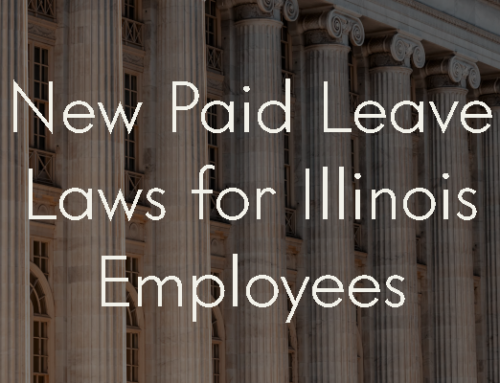There have been some important updates in Employee Sick Leave Laws in Illinois! Chicago, Cook County, and the state of Illinois have all had some changes to their laws regarding sick leave. Chicago and Cook County now have mandatory sick leave for almost all employers with employees in their jurisdiction. Read below for more details about the new sick leave laws:
Cook County
Chicago and Cook County have enacted similar laws that take effect on July 1, 2017, requiring employers to offer all of their employees up to 5 days of paid sick leave each year. This applies to any employer who has an employee that:
- Works for the employer at least 80 hours within any 120-day period, and
- Spends at least two hours of work in Cook County within a two week period, even if the employer’s main offices aren’t in Cook County.
Requirements:
- Accrual. Sick leave accrues 1 hour for every 40 hours worked. An employee exempt from overtime requirements will be deemed to work 40 hours per week unless his or her normal week is less than 40 hours. Accrual starts on the employee’s first day of work or July 1, 2017, whichever is later. There can be a cap of 40 hours accrued per 12 months. At the end of the 12 month period, the employer must permit carry over up to 20 hours, and an additional 40 for employees subject to the FMLA for FMLA uses.
- Use. Employers must allow use starting 180 days after hire. Employers must also allow the employee to determine how much accrued sick leave is needed, although the employer may set a minimum increment requirement not to exceed four hours per day. Employees can use sick leave when: the employee or a family member is ill, injured, or receiving medical care/treatment/diagnosis/preventative medical care; the employee or family member is a victim of domestic violence as defined by law; the employee’s place of business is closed due to public health emergency; or the employee needs to care for a child whose school/daycare has been closed due to a public health emergency.
- Employee Notice and Documentation. Employers can require up to 7 day notice where the employee’s need for leave is reasonably foreseeable, or notice “as soon as is practicable”, via text, phone call, or email, if it is not reasonably foreseeable. If an employee is absent for more than three consecutive workdays, employers can require a note from a health care professional or similar certification, but can’t require specific diagnoses or information.
- Other Requirements. Employers can’t require the employee to find a replacement worker.
- Workplace Notices. Employees must post a notice about this law at each facility where a covered employee is employed and must notify employees of their rights upon hire.
Please note that if an employer has a policy that meets or exceeds the above requirements, they don’t have to change their policy to match these terms.
Illinois
Illinois has also passed a new law regarding sick leave, called the Employee Sick Leave Act, which went into effect this year. This law does not require an employer to provide sick leave. The Illinois law only requires employers to allow employees to use at least half of any sick leave already available for the illness, injury, or medical appointment of family members.
A “family member” includes an employee’s child, stepchild, spouse, domestic partner, sibling, parent, mother-in-law, father-in-law, grandchild, grandparent, or stepparent.
Next Steps for Employers
If you are an employer in Illinois (especially in Cook County), you should create a sick leave policy or look over your current sick leave policy and adjust it so that it meets all of the requirements in the law to avoid hefty fines and lawsuits. You also need to make sure to post the required notices in the workplace, which can be found on the City of Chicago website and the Cook County Commission on Human Rights website. You may find it helpful to talk to an attorney to make sure your policies meet all of the legal requirements.




